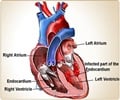
To make their discovery, Ward and colleagues obtained specialized heart muscle cells, called "cardiomyocytes" (CMs), from normal rats and incubated them in the laboratory with C5a. They found that the cardiomyocyes released specialized immune cells, called cytokines (IL-6 and TNF alpha), in a time-dependent and dose-dependent manner. Sepsis was also induced in mice, and CMs isolated from these mice and examined in vitro. The scientists found that these cells spontaneously released a variety of cytokines, several of which appeared to have the potential to harm the heart. When other mice with beginning stages of sepsis were injected with an antibody to neutralize C5a, the activity of the heart-harming cytokines was reduced. Furthermore, when mice bred to lack receptors for C5a were subjected to sepsis, little or no spontaneous release of cytokines from heart cells occurred.
"Under the best circumstances, sepsis is unpredictable and difficult to treat," said Gerald Weissmann, M.D., Editor-in-Chief of The FASEB Journa1, "It's perhaps the most serious problem in emergency medicine and when sepsis affects the heart it moves from serious to grave. Now that we know that C5a is at least partly responsible, antibodies to C5a promise to get to the heart of the problem."
According to the National Institute of General Medical Sciences, NIH, Sepsis is a major challenge in the intensive care unit, where it is one of the leading causes of death. It is caused when immune chemicals released into the blood to combat infection trigger widespread inflammation, resulting in impaired blood flow, which damages the body's organs by depriving them of nutrients and oxygen. In the worst cases, the heart weakens and multiple organs lungs, kidneys, liver may quickly fail and the patient can die. Each year, severe sepsis strikes about 750,000 Americans, and as many as half die, which is more than the number of U.S. deaths from prostate cancer, breast cancer and AIDS combined.
Source-Eurekalert















